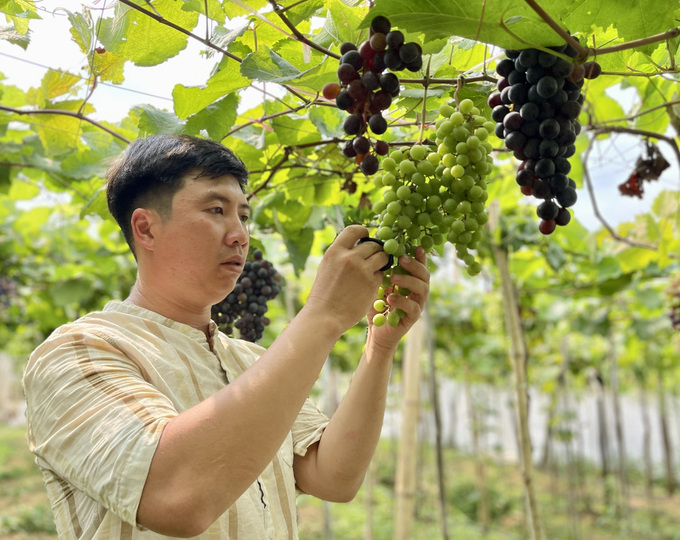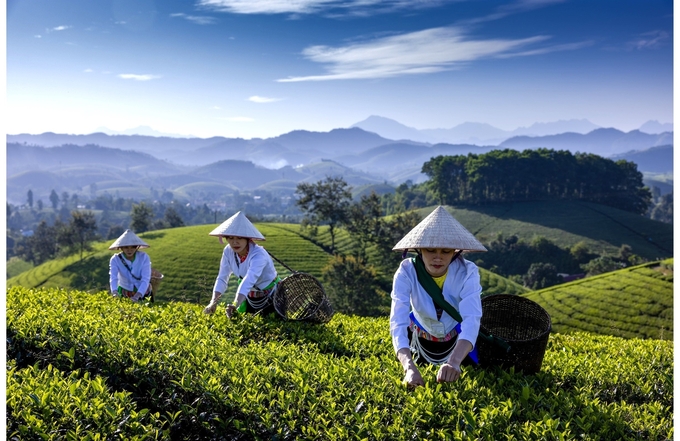December 31, 2025 | 19:54 GMT +7
December 31, 2025 | 19:54 GMT +7
Hotline: 0913.378.918
December 31, 2025 | 19:54 GMT +7
Hotline: 0913.378.918
At the 2024 Farmers Dialogue Conference, Prime Minister Pham Minh Chinh directed ministries, branches and local authorities to focus on removing obstacles in institutions, land, taxes, fees and credit to promote agricultural development.
The Prime Minister also mentioned a number of key tasks: performing industry planning and expanding agricultural product markets specifically Halal food; promoting the application of science and technology, digital transformation and artificial intelligence; training high-quality human resources; innovating rural culture; liberating land resources; enhancing dialogue between the government and farmers to resolve difficulties promptly.
The Government Office issues Document No. 1311/VPCP-NN dated February 18, 2025, conveying the Prime Minister's opinions on implementing solutions to promote and support farmers after the 2024 Farmers Dialogue Conference.
Accordingly, the Prime Minister requests the Ministry of Agriculture and Rural Development (MARD) to remove bottlenecks in organizing agricultural production to unleash farmers' resources and solidify the direction of "Ecological Agriculture - Vibrant Countryside - Innovative Farmers".

The Prime Minister requested that agricultural production forms in rural areas be reorganized and innovated. Photo: Dang Lam.
It is crucial to develop preferential mechanisms and policies for production, remove all barriers regarding land, administrative procedures, and regulatory compliance costs for people and businesses; and synchronously implement programs, plans, projects, and tasks to promote agricultural restructuring according to three axis groups of key product (national, regional, local).
The Ministry of Agriculture and Rural Development will evaluate the results of the pilot construction of five concentrated raw material areas for agricultural commodities, and guide localities to develop concentrated, large-scale raw material and commodity production areas to meet the requirements of the domestic and export markets.
The MARD will reorganize and innovate agricultural production forms in rural areas, and come up with appropriate and effective production organization forms associated with the process of digital transformation and digital economy development.
There is also a demand to build mechanisms and policies in order to promote sustainable mariculture and seafood exploitation. Relevant sectors should study and propose setting up a fund for fisheries infrastructure development, and develop solutions to protect aquatic resources and biodiversity in fishing grounds with the main focus on resolving EC recommendations to remove the "yellow card" in 2025.
The MARD coordinates with the Central Committee of the Vietnam Farmers' Union to complete the set of farmers' assessment indicators for agricultural input quality; the Vietnam Farmers' Union Schemes on the dissemination of food safety assurance and the development of collective economy in agriculture until 2030. The ministry will work with the Central Committee of the Vietnam Farmers' Union and relevant agencies to evaluate and summarize the 5-year implementation of the Resolution of the 13th National Party Congress on "Ecological Agriculture - Vibrant Countryside - Innovative Farmers".
The Government Office requests the Ministry of Natural Resources and Environment (MONRE) to continue reviewing legal documents on land in the direction that all regulations aim to liberate land resources and maximize land efficiency, coordinate with ministries, agencies and localities to strengthen guidance and dissemination of regulations of the 2024 Land Law.

Removing bottlenecks in organizing agricultural production is the key to unleashing resources for farmers. Photo: Hoang Anh.
The MONRE shall preside over and coordinate with relevant agencies to establish a special working group of the Prime Minister to inspect the current status of land use at state-owned forestry farms and report to the Prime Minister the inspection results in the second quarter of 2025. The goal is to construct mechanisms and policies for the effective exploitation of land resources.
The Ministry of Finance summarizes and evaluates the implementation results of Decree No. 58/2018/ND-CP dated April 18, 2018, of the Government on agricultural insurance; studies, amends and supplements a number of articles of Decree No. 58/2018/ND-CP to soon form an agricultural insurance market.
The Ministry of Planning and Investment studies, issues specific breakthrough incentive policies and develops policies to encourage organizations, businesses, individuals as well as large FDI enterprises and corporations to invest in Vietnam’s agriculture and countryside.
The Ministry of Industry and Trade continues its research to open new markets including the Halal food market, and develop “Bring national agricultural product brands to the world” programs for key agricultural products with export strengths such as rice, coffee, pepper, tropical fruits, and seafood.
The State Bank of Vietnam coordinates with ministries and localities to promote the implementation of specific credit programs, such as the Loan Program linked to the implementation of the Scheme on 1 million ha of high-quality and low-emission rice in the Mekong Delta, or the Loan Program for the forestry and fishery sectors.
As per the Prime Minister’s request, in the process of implementing the arrangement and streamlining of the administrative apparatus, ministries, agencies, and localities must not interrupt work, not leave localities unattended, and continue to promote agricultural and rural development.
Translated by Samuel Pham

(VAN) Located in three former provinces, Nam Dinh, Thai Binh, and Ninh Binh, and now in two provinces, Ninh Binh and Hung Yen, "Red River Delta" is the name of Vietnam's first interprovincial coastal wetland World Biosphere Reserve.
/2025/12/29/1046-1-210728_624.jpg)
(VAN) In 2025, Viet Nam recorded severe and extreme disasters, breaking multiple historical records and causing heavy losses in lives, property, and infrastructure nationwide.

(VAN) Applied technologies, water-saving irrigation is a strategic solution to promote climate-resilient agriculture and strengthen water security in the uplands.
/2025/12/29/3936-3-163422_251.jpg)
(VAN) Can Gio mangrove forest in particular and the entire Can Gio Mangrove Biosphere Reserve in general hold great potential for carbon credits.

(VAN) Chu Pah Rubber has announced its products that comply with the EU Deforestation Regulation (EUDR), affirming its commitment to sustainable production and product origin transparency.

(VAN) Deputy Director Nguyen Hoai Nam stated that a digital data platform will be developed with agricultural sector databases, utilizing AI to help farmers make informed decisions on 'watering correctly, sufficiently, and efficiently.’
/2025/12/29/4841-2-134224_777.jpg)
(VAN) From only about 10 individuals in 2009, the wild elephant population in Dong Nai has recovered to nearly 30 animals after more than 10 years.